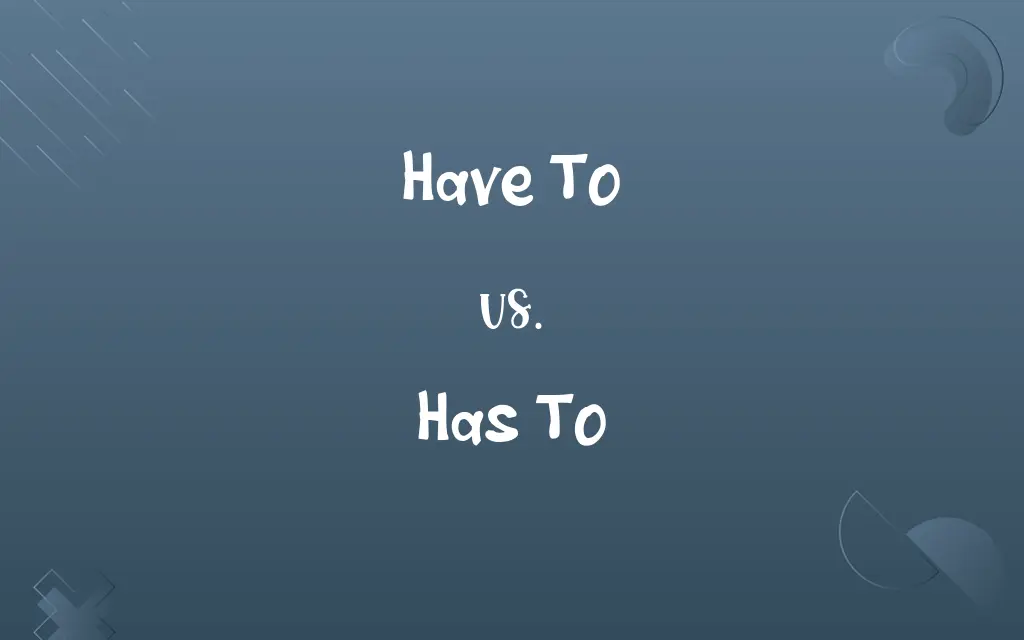Have To vs. Has To: Know the Difference

By Shumaila Saeed || Published on February 28, 2024
"Have to" and "has to" are phrases indicating necessity or obligation, with "have to" used with I/we/you/they and "has to" with he/she/it.

Key Differences
"Have to" and "has to" are both expressions used to convey the idea of necessity or obligation. "Have to" is used with the pronouns I, you, we, and they, while "has to" is used with the third person singular pronouns he, she, and it.
Shumaila Saeed
Feb 28, 2024
In the present tense, "have to" and "has to" show a slight difference in conjugation based on the subject. "I have to finish my work" shows first person usage, whereas "She has to go to school" uses the third person singular form.
Shumaila Saeed
Feb 28, 2024
Both expressions imply something is necessary or required. "We have to obey the rules" and "He has to obey the rules" both convey obligation but differ in the subject-verb agreement.
Shumaila Saeed
Feb 28, 2024
When negated or used in questions, "have to" and "has to" maintain their respective subject agreements. "Do you have to leave?" versus "Does he have to leave?" show how questions are formed, while "We don't have to stay" versus "He doesn't have to stay" demonstrate negation.
Shumaila Saeed
Feb 28, 2024
This difference remains consistent across different tenses. In the past tense, "had to" is used for all subjects. For example, "I had to go" and "She had to go" indicate that the rule of "have to" and "has to" changes with tense.
Shumaila Saeed
Feb 28, 2024
ADVERTISEMENT
Comparison Chart
Example Sentence
"We have to study for the exam."
"She has to study for the exam."
Shumaila Saeed
Feb 28, 2024
Usage in Continuous Tense
"They are having to wait outside."
"He is having to wait outside."
Shumaila Saeed
Feb 28, 2024
ADVERTISEMENT
Reflecting Obligation
Indicates obligation for plural subjects
Indicates obligation for singular subjects
Shumaila Saeed
Feb 28, 2024
Have To and Has To Definitions
Have To
Indicates a necessity or requirement.
I have to complete my assignment tonight.
Shumaila Saeed
Jan 18, 2024
Has To
Indicates a requirement for a singular entity.
The car has to be serviced annually.
Shumaila Saeed
Jan 18, 2024
Have To
Used to strongly suggest an action.
You have to try this new restaurant.
Shumaila Saeed
Jan 18, 2024
Has To
Expresses personal obligation for an individual.
He has to take his medication every day.
Shumaila Saeed
Jan 18, 2024
ADVERTISEMENT
Have To
Refers to future obligations.
We have to meet our clients next week.
Shumaila Saeed
Jan 18, 2024
Has To
Refers to actions that cannot be avoided.
The machine has to be turned off at night.
Shumaila Saeed
Jan 18, 2024
Have To
Implies a mandate based on law or rule.
We have to wear helmets when riding a bike.
Shumaila Saeed
Jan 18, 2024
Has To
Indicates necessity for a singular subject.
She has to finish her report by Monday.
Shumaila Saeed
Jan 18, 2024
Have To
Indicates societal or personal expectations.
They have to be at the meeting by 9 AM.
Shumaila Saeed
Jan 18, 2024
Has To
Implies enforcement of rules on a singular subject.
He has to follow the company's guidelines.
Shumaila Saeed
Jan 18, 2024
Repeatedly Asked Queries
Can "have to" indicate a strong suggestion?
Yes, "have to" can be used to give strong advice or suggestions.
Shumaila Saeed
Feb 28, 2024
Can these phrases be negated?
Yes, "don't have to" and "doesn't have to" are their negative forms.
Shumaila Saeed
Feb 28, 2024
How do you form questions with "have to" and "has to"?
Use "do/does" as in "Do you have to?" or "Does she have to?"
Shumaila Saeed
Feb 28, 2024
Can "have to" and "has to" be used interchangeably?
No, they cannot. They must agree with their subject's number and person.
Shumaila Saeed
Feb 28, 2024
Is "has to" a modal verb like "must"?
"Has to" is similar to "must" but not technically a modal verb.
Shumaila Saeed
Feb 28, 2024
Can these expressions imply legal obligations?
Yes, they can indicate legal or regulatory necessities.
Shumaila Saeed
Feb 28, 2024
Are these phrases common in everyday English?
Yes, they are commonly used to express necessity.
Shumaila Saeed
Feb 28, 2024
Is "have to" used for past obligations?
For past obligations, "had to" is used for all subjects.
Shumaila Saeed
Feb 28, 2024
Is "has to" only used for singular subjects?
Yes, "has to" is used with singular third-person subjects (he, she, it).
Shumaila Saeed
Feb 28, 2024
How are "have to" and "has to" used in passive voice?
They are used similarly, as in "It has to be done" or "They have to be informed."
Shumaila Saeed
Feb 28, 2024
How is the future tense formed with "have to"?
By using "will," as in "You will have to see the doctor."
Shumaila Saeed
Feb 28, 2024
Are these phrases used in formal writing?
Yes, both are acceptable in formal and informal contexts.
Shumaila Saeed
Feb 28, 2024
Is there a difference in emphasis between the two?
No, the emphasis on obligation is the same; only the subject changes.
Shumaila Saeed
Feb 28, 2024
Do "have to" and "has to" have the same level of necessity as "must"?
Generally, yes, but "must" might imply a stronger, more immediate obligation.
Shumaila Saeed
Feb 28, 2024
Can these phrases imply personal preference?
Not typically; they usually suggest external obligation or necessity.
Shumaila Saeed
Feb 28, 2024
Are there any exceptions to the usage of "have to" and "has to"?
The main exception is subject-verb agreement; otherwise, their use is quite consistent.
Shumaila Saeed
Feb 28, 2024
Can "have to" be used for future obligations?
Yes, it can indicate future necessities.
Shumaila Saeed
Feb 28, 2024
Can "have to" be used with "I" or "you"?
Yes, it's used with "I," "you," "we," and "they."
Shumaila Saeed
Feb 28, 2024
Is "has to" used in continuous tenses?
Yes, it can be, as in "He is having to adjust his plans."
Shumaila Saeed
Feb 28, 2024
Is the use of "have to" and "has to" different in American and British English?
No, the usage is the same in both dialects.
Shumaila Saeed
Feb 28, 2024
Share this page
Link for your blog / website
HTML
Link to share via messenger
About Author
Written by
Shumaila SaeedShumaila Saeed, an expert content creator with 6 years of experience, specializes in distilling complex topics into easily digestible comparisons, shining a light on the nuances that both inform and educate readers with clarity and accuracy.








































































